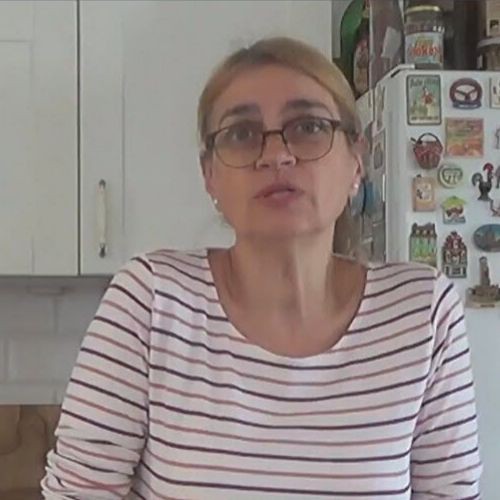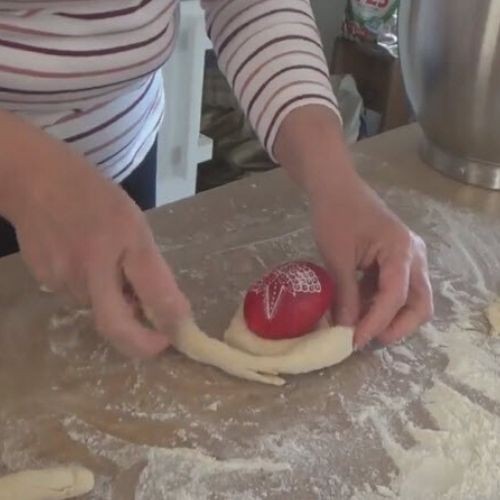Museums, galleries, concert halls, chitalishta (community culture clubs) have, for two months, been empty of people. For an obvious reason – they are all subject to the restrictive measures during the pandemic. Our material world may be restricted, but the spirit cannot be quarantined. Humans have always striven to learn something new, to live a full life, to work and look forward to the days of leisure.
In an endeavor to keep the contact with its public alive, one of the most popular museums in Sofia – the Ethnographic Museum - took its programme online. With much ingenuity and enthusiasm, the researchers have continued to be helpful to the public by taking their efforts online. They posted a new video on the museum’s social media profile dedicated to the spring feast days. Their contact with the public is interactive and anyone can post a photograph or share their own experience of the topic the museum suggested – old techniques of painting Easter eggs, making and decorating ritual loaves, the intricacies of home-made leaven which makes home-baked bread and pastry so much tastier.
The video demonstration of how ritual bread is made was given by the director of the Ethnographic Museum herself – Dr. Iglika Mishkova.
 “Feast days are a time which brings us together, setting us apart from our work days. The period of isolation is a perfect opportunity to involve the entire family in the preparations. That is why we decided to start with postings on our Facebook profile,” she told Radio Bulgaria and added: “It was all done from home, my own home – I demonstrated the way I myself and my family prepare for the feast day.”
“Feast days are a time which brings us together, setting us apart from our work days. The period of isolation is a perfect opportunity to involve the entire family in the preparations. That is why we decided to start with postings on our Facebook profile,” she told Radio Bulgaria and added: “It was all done from home, my own home – I demonstrated the way I myself and my family prepare for the feast day.”
“In Bulgarian tradition bread is the bloodless sacrifice. It is something we cherish and an essential element of the table we set for any holiday. Initially, our forefathers made ritual bread at Easter and only later, after the country’s liberation in 1878 did sweet bread, kozunak, make its way in the country.”
Now people are reverting to a slower pace of life giving us a wonderful opportunity to give our closest ones more of our attention. “The time spent at home is an opportunity to appreciate everything we had – even going to work as a daily process,” Iglika Mishkova says.
 As a way to go back to an old but forgotten tradition, the ethnologist suggests a demonstration of how to make leaven at home. “The technology is slow and requires attention but making leaven teaches one to be patient,” Iglika Mishkova says and adds:
As a way to go back to an old but forgotten tradition, the ethnologist suggests a demonstration of how to make leaven at home. “The technology is slow and requires attention but making leaven teaches one to be patient,” Iglika Mishkova says and adds:
“If you wish to make leaven and use it instead of ready-made yeast you should know that any time of year is suitable. The only requirement is to “feed” the leaven for a longer period, around one week, with flour and water. It needs a little bit more attention but leaven makes the kozunak so much tastier, more fragrant and even more beautiful to look at. In our tradition, and in folk songs, there are two feasts that go together – “red Easter and green St. George’s Day”. For St. George’s Day, 6 May, we shall tell the story of the feast day itself, connected with the work people do, not just the festive meal. We are considering different options, we are working on the topic so we can give our public information that is interesting and helpful.”
Photos: Marta Ros, Facebook/ National Ethnographic Museum - BASThe 51 st Sofia International Book Fair opens today at the National Palace of Culture in Sofia. The forum, which will be on until 15 December, is organized by the Bulgarian Book association. 160 publishing houses are taking part in the forum..
"Through his plays, Jean-Pierre Martinez strives to restore the prestige of comedy as a mirror held out to society" - the playwright's website states. Martinez is the author of 101 comedies performed all over the world, which are studied in French schools..
Bulgarian writer Georgi Gospodinov is one of twelve writers from around the world invited to become international members of the British Royal Society of Literature, the organisation announced on its website . The writers were selected by a committee..
"Thank you to Petar Angelov, Michaela Velichkova, Sonia Chakarova and all the members of the representative folklore ensemble Shevitsa for the..
After the state-run record company Balkanton was closed down in 1994, no gramophone records have been manufactured in Bulgaria. This is going to change..

+359 2 9336 661
